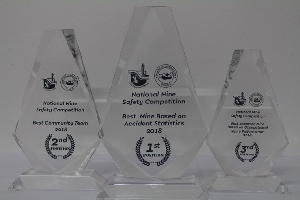Gold Fields Ghana Limited, (GFGL) has picked up three awards in recognition of the mine’s efforts in reducing injury and promoting safe operations at its mine.
GFGL, which operates the Tarkwa mine, was adjudged the Best Mine Based on Accident Statistics for 2018 at the National Mine Safety Competition jointly organised by the Minerals Commission and the Chamber of Mines.
The Tarkwa mine, which has a workforce (employees and contractors) of over 4,400, impressively recorded a Total Recordable Injury Frequency Rate (TRIFR) of 0.29 as at the end of October this year. The TRIFR measures the number of work-related injuries that require medical treatment which occur within every one million man-hours worked.
“Our remarkable TRIFR record shows that the frequency with which injuries occur at our mine is very low. We are on course towards achieving our objective of Zero Harm. We have been able to reduce injuries on the mine from 62 in 2010 to 12 in 2018,” said Mr Stephen Osei-Bempah, the General Manager of GFGL.
“Our prompt reporting of incidents to the Minerals Commission and the phenomenal lower injuries and TRIFR won us the Best Mine Based on Accident Statistics award,” he added. Mr Osei-Bempah further noted that the mine’s safety performance was impressive in 2017 as well, with a total of five injuries and a TRIFR of 0.18.
The Tarkwa mine also placed second and third in the ‘Best Community Team’ and ‘Best Improved Mine Based on Occupational Injury Performance’ categories respectively, at this year’s competition which took place at the Newmont Akyem mine in the Eastern Region.
Mr Osei-Bempah said the mine’s safety record was unrivalled because controls have been put in place to eliminate hazards and minimise injuries in order to make the workplace safer for employees.
“Safety is our number one value and our principle is that if we cannot mine safely, we will not mine at all. We have adopted technologies and initiatives to ensure that our employees are provided with a safe working environment.”
“When you compare the size of the mine, number of employees, and all the mine-related activities to the low number of injures recorded this year, it is a clear indication that our controls are effective,” he explained.
According to Gold Fields, safety regulations are strictly enforced on the mine, and there are constant refresher courses on safety protocols for employees. Also, newly recruited workers and visitors undergo an induction to be aware of the dos and don’ts at the mine.
The Tarkwa mine, which is the single largest gold mine in the country, also runs several safety campaigns throughout the year to create awareness. One of such campaigns is the “Take 5 Safety Awareness Campaign” which encourages workers to spend five minutes to assess the risks associated with tasks they are about to perform.
“No work commences without a risk assessment. The employee is required to go through a check list to identify the possible risks associated with a task and how those risks can be eliminated or minimised.
Employees must also make sure that they put on the right personal protective equipment before performing tasks,” said Mr Charles Opoku-Amoateng, the Safety and Occupational Hazard Manager of GFGL.
The Tarkwa mine introduced an injury-free challenge in 2011, which records the number of days that the mine operates without an injury. In 2017, the mine operated for 232 days without any injury. The mine had earlier achieved 100 injury-free days and 150 injury-free days. After each milestone, a higher target is set.
“Our current target is to go 250 days without any injury; we are currently on day 21. We focus on all incidents including fatalities and minor injuries,” said Mr Opoku-Amoateng.
As at the end of October 2018, over 165,000 hazards had been reported by employees, which Mr Opoku-Amoateng said was very impressive, adding that 92% of the reported hazards had been mitigated.
Business News of Tuesday, 27 November 2018
Source: newswiregh
Gold Fields Tarkwa mine wins three safety awards
Entertainment












